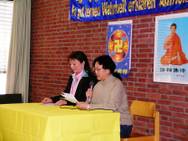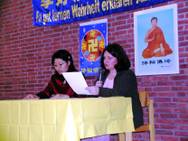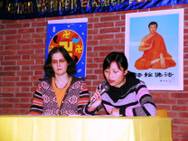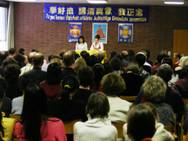On the afternoon of December 30th, 2005, two hundred Falun Gong practitioners attended the annual German cultivation experience sharing conference held in Erbach, Germany. The experience sharing conference has become a focal point of the annual four-day-long New Year gathering in recent years.
Since most practitioners outside China have not personally experienced the evil persecution taking place in China, and only read reports of the persecution on the Internet, a lot of them were deeply shocked and moved to tears when a female practitioner in her fifties described how she overcame the fear and stepped forward to expose the persecution in China and how she and other practitioners were subsequently persecuted in China’s labour camps.
Another female practitioner, also in her fifties, gave an account of how she was forced to leave her home in China. When she attended the petition activities at the Chinese Consulate for the first time after arriving in Germany, she could not help but burst into tears for it had been four years that she wasn’t able to practise Falun Gong exercises publicly.
Besides exchanges about the situation in China, there were five practitioners who shared how they cultivated themselves in a far friendlier environment on foreign soil. A western practitioner delivered a speech about how she got rid of the attachment of unwillingness to shouldering responsibilities before she was finally able to handle events independently, such as organising photos for exhibitions.
Cultivation is not equivalent to doing work. This was an experience shared by a Chinese practitioner from southern Germany. Reminded by other practitioners, she realised when she was composing a group dance for fellow practitioners that she didn’t spend enough time studying the principles of Falun Dafa. After she strengthened her study and started reading one lecture of Zhuan Falun every day, she recognised her attachment very easily, and came to the enlightenment that cultivation is not doing work.
The rest of the practitioners who gave speeches at the conference also talked about their cultivation experience obtained from attending Falun Gong activities. At the dining table after the conference, some practitioners were still discussing what they had learned from the conference. Some said they had noticed their own shortcomings by listening to the speeches; some stated that they had established a better understanding about issues they used to feel unclear about in the past. For them, this experience sharing conference has been a site to “encourage cross learning and mutual cultivation”.
* * *
You are welcome to print and circulate all articles published on Clearharmony and their content, but please quote the source.














 more ...
more ...